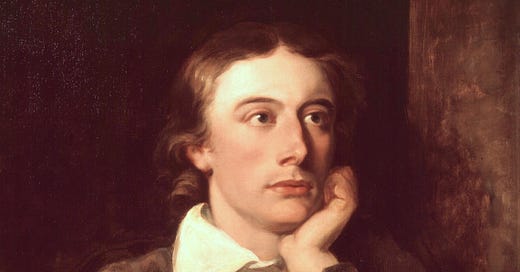In the spring of 1819, Keats was at the height of his genius; within the next few months he would write his finest poems. In a letter from April 21, 1819 to his other brother, George, who had emigrated to America, Keats revisited his philosophy, unveiling the “system of Spirit-creation” that he’d been designing and testing for more than a year: the world as the “vale of Soul-Making.”
Keats argued that any attempts to improve one’s life still end in death—a fate that he acknowledged as unbearable without some notion of redemption. And yet he rejected the idea of the afterlife or religious salvation—those, in his view, devalue the act of suffering, because they serve no creative purpose and teach nothing to the human individual.
Instead, he referred to the raw material of a soul as an “intelligence.” All humans have (or are) an intelligence, but they’re not considered souls until they develop an individual identity. Soul creation takes place over the span of many years and requires two components—the human heart and the world of feverish suffering—comprising a process that Keats likens to an education:
— The Paris Review, 2014
“The common cognomen of this world among the misguided and superstitious is ‘a vale of tears’ from which we are to be redeemed by a certain arbitrary interposition of God and taken to Heaven — what a little circumscribed straightened notion!
Call the world if you please “The Vale of Soul-Making.” Then you will find out the use of the world (I am speaking now in the highest terms for human nature admitting it to be immortal which I will here take for granted for the purpose of showing a thought which has struck me concerning it.)
I say “Soul Making” — Soul as distinguished from an Intelligence. There may be intelligences or sparks of the divinity in millions, but they are not Souls till they acquire identities, till each one is personally itself.
Intelligences are atoms of perception — they know and they see and they are pure, in short they are God. How then are Souls to be made? How then are these sparks which are God to have identity given them — so as ever to possess a bliss peculiar to each ones individual existence? How, but by the medium of a world like this?
This point I sincerely wish to consider because I think it a grander system of salvation than the Christian religion — or rather it is a system of Spirit-creation. This is effected by three grand materials acting the one upon the other for a series of years…
These Materials are the Intelligence; the human Heart (as distinguished from Intelligence or Mind); and the World or Elemental space suited for the proper action of Mind and Heart on each other for the purpose of forming the Soul or Intelligence destined to possess the sense of Identity.
I can scarcely express what I but dimly perceive — and yet I think I perceive it — that you may judge the more clearly I will put it in the most homely form possible:
I will call the world a School instituted for the purpose of teaching little children to read. I will call the Child able to read, the Soul made from that School and its Hornbook†.
Do you not see how necessary a World of Pains and troubles is to school an Intelligence and make it a Soul? A Place where the heart must feel and suffer in a thousand diverse ways! Not merely is the Heart a Hornbook, it is the Minds Bible, it is the Minds experience, it is the teat from which the Mind or intelligence sucks its identity.
As various as the Lives of Men are, so various become their Souls, and thus does God make individual beings, Souls, Identical Souls of the sparks of his own essence…”
— John Keats, Spring 1819
Discussion:
What do you think of Keats’ vision of the world as a school where souls are made?
What about his idea that the Soul isn’t given, that it has to be made?
Can you hear his struggle to put intuitive knowing into words?
Can you sum up his philosophy in your own words?






Many things come to my mind when I think about Keats’ vision of the world as a school where souls are made.
I am thinking about my own schooling in the 1960’s and 1970’s where learning sacred poetry by heart was privileged. A schooling where a philosophy of “hard knocks” was indeed the unspoken way of soul building. I am thinking about how that discipline,in turn, has made Keats’ “Ode to Melancholy” accessible to me at every single heart break in my life.
The other thread of reflection concerns the psycho spiritual crisis occurring around us, as the world crumbles. Materialism and the prioritising of economic and political concerns over ecological priorities blinds us in the “western world” to suffering. I wonder how much the frightening rise in mental health issues in the developed world is a result of the subsequent lack of opportunity,through politico-economic policy and the purchase of comfort goods, to make our souls?
For me, Keats’ ideas speak to an individual and collective way of an evolution of consciousness. Ethical values, compassion, voluntary simplicity and an honouring of earth are the stuff of soul-making.